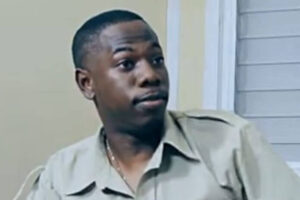Kayla, of course, was very, very good, but the ultimate sensation of Bad Ting Mek Laugh was Corporal Makute – Paul Gamboa. It seemed as if the sky was the limit for the show, and for him. But, this is not the way things work in Belize.

I’m not going to call names, but when I was a younger man in the 1960s and 1970s, I saw where it really didn’t matter, in the end, how talented you were, once you came from the ghetto or the streets, or whatever you want to call it. If the power structure behind the scenes did not bless and support you, you would end up falling on your face.
So, a couple brothers who became big time in the administration of the sports world in Belize, for instance, were brothers who decided, at a critical point, to go along with the power structure. This meant in some cases that they had to go against their own kind, but this was the price they paid for their power and glory.
When I was younger, I was angry at those brothers. As the years have gone by, however, I have realized that we black and brown Belizeans could not sustain our own. We produced talent, but we could not protect it and nurture it. I suppose the bottomline is that we, as a community, had not built a financial framework.
Isaiah Morter was an African Belizean who became a native millionaire in the late nineteenth/early twentieth century. It is difficult to conceive how he accomplished this feat in British Honduras, because the culture of our people, as late as when I was growing up in the 1950s and 1960s, looked down on natives who focused on the accumulation of money and assets. The saying was, and the majority of parents repeated it to their children: “Yu like money. You wan bad.”
So, we had a culture which emphasized camaraderie and communion with each other. I guess we justified our perspective on the grounds that the Holy Bible described money, or the love thereof, as “the root of all evil.” As poor as we were, people of color had a certain comfort zone here because of their clear majority in the population. In the middle of the twentieth century, Belizeans of color led the population in the anti-colonial rebellion against our British masters.
I think if it were possible to organize Belizeans in the United States around some burning vision, you might be able to pool a substantial sum of money. But, there was only one time there was such a “burning vision,” and that was in the 1960s when our people in the diaspora were generally motivated to resist the Guatemalan claim. Belizeans abroad financed the British Honduras Freedom Committee, and they financed it well.
The fact of the matter is that people who had migrated into the colony from the Middle East and Eastern Europe felt the toughness of their situation in Belize and understood the importance of financial strength and security. Today, you have families in Belize which originated in Palestine, Lebanon, Romania, and other countries far away in the first half of the twentieth century, who are very wealthy and powerful.
The Mennonites came in 1958, and now they are also awesomely wealthy and powerful. The merchant class which came from India in the second half of the twentieth century is also awesomely wealthy and powerful. So are the Chinese and Taiwanese. They all appreciated the value of money.
The vast majority of the migrants who control our wealth here give no support to arts and sports in the nation-state of Belize. The talent in local arts and sports mostly originates from the ghetto, the streets. The native people from whom said talent emerges, are not in a financial position to support, to patronize their own arts and sports.
The speed with which Bad Ting Mek Laugh faded away was incredible. This type of thing had happened before to my eldest son, Mose, so he was able to withstand the shock. Corporal Makute, who lit up the camera in spectacular fashion, became a radio deejay at KREM. Somewhere along the way, and the journey through the pandemic no doubt made things so much worse, Paul Gamboa, this magnificent talent, began to lose focus. That is all I can say. I pray that he succeeds in coming back from the stress.
Gifted humans experience life in a deeper way. Gifted humans are more sensitive, more vulnerable. Thoroughbreds are more fragile than mustangs. This is how the world is. Spice is a great talent. Come back strong, my young brother.

